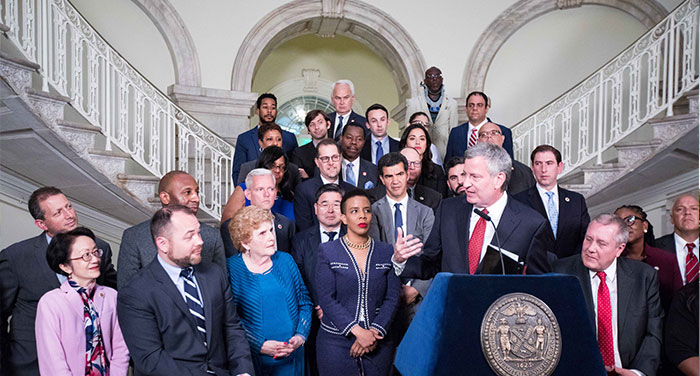Photo Courtesy of Benjamin Kanter/Mayoral Photography Office
Mayor de Blasio and City Council Speaker Corey Johnson announced an agreement on an early, balanced $89 billion budget for Fiscal Year 2019 in the rotunda at City Hall on June 11.
By Forum Staff
While the City economy is thriving, its “many needs” make it more urgent than ever to prepare for the future, City Comptroller Scott Stringer said last week as he released his analysis of the Big Apple’s Fiscal Year 2019 Adopted Budget.
A one-time infusion of income tax revenues in FY 2018 helped the City balance the $89.16 billion budget for FY 2019, according to the report. However, Stringer said his analysis reiterates the need for long-term attention to the City’s out-year gaps and the need to align spending and revenue growth.
“There is no question – bringing spending into line with revenue growth and bolstering reserves is necessary for enshrining our progressive values and policies for the next generation. From preserving our affordable housing stock to improving our mass transit infrastructure, our city is facing looming challenges that will require long-term investment,” the comptroller said. “That’s why, just as we have a four-year financial plan, we must have a four-years saving plan. It’s one tool for ensuring the strong financial footing of our city for years to come.”
Report highlights include:
• The City’s adopted budget is essentially flat over last year, down by 0.5 percent. However, accounting for prepayments and reserves, spending for FY 2019 will increase $2.9 billion, or 3.2 percent, from last year’s spending levels, to $92.36 billion;
• Expenditures are projected to grow an average 1.7 percent annually in the remaining years of the plan through FY 2022, driven by spending on salaries and wages, debt service, health insurance, and other fringe benefits; and
• The comptroller’s analysis projects a small surplus in FY 2019 of $151 million, and larger budget gaps of $4.18 billion, $3.84 billion, and $3.42 billion in FY 2020 through FY 2022.
According to the comptroller, two recent “notable” developments have implications for the City’s budget going forward: the City and its public housing authority entered into a consent decree with federal prosecutors which requires the City to provide an additional $1 billion in capital funding over the next four years, and to maintain a projected $1.7 billion in other funding commitments during the same period; and the City and District Council 37, reached a labor settlement; at the same time an agreement on additional healthcare savings, applying to all City employees, was approved by the Municipal Labor Committee. The cost of the DC 37 agreement, net of the budgeted labor reserve and healthcare savings, is projected to add $425 million in spending from FY 2018 through FY 2022, Stringer said.

